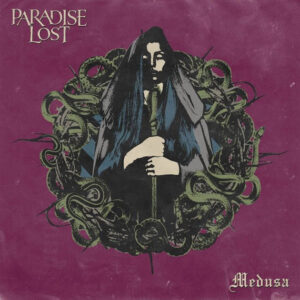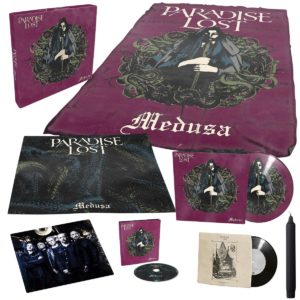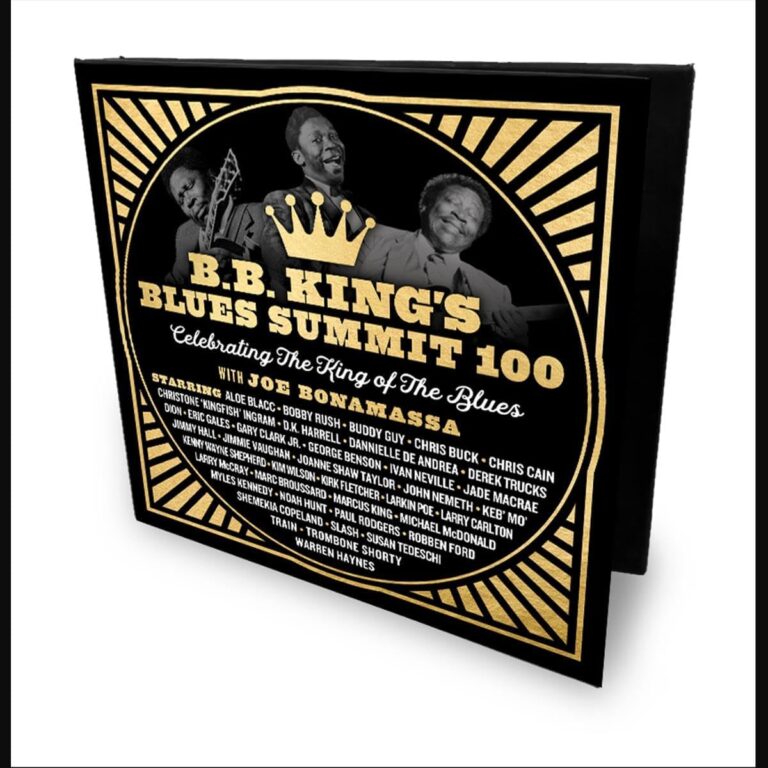
Paradise Lost have followed an impressive, if occasionally unpredictable, trajectory over the course of their lengthy career. Arguably it is Paradise Lost, of the big three of UK doom, who have embraced the most change. In contrast to My Dying Bride, who have remained remarkably consistent and Anathema, who have evolved steadily; Paradise Lost have a taken a rather more abstract approach, embracing everything from electronica to full-blown death metal along the way. That the band retain a loyal following is a testament to the unifying elements that hold it all together – the tough, yet ethereal riffing of Greg Mackintosh and the gruff, melodic vocals of Nick Holmes – and to the overall quality of each and every album to which the band have put their name.
Whilst fans may argue over which period they prefer, there is no question that recent albums have seen Paradise Lost carve a path back towards the extreme end of the metal spectrum and ‘Medusa’, the band’s fifteenth album, is easily the heaviest work they’ve put their name to since 1991’s ground breaking ‘gothic’. Stately and possessed of an atmosphere of dank decay, it follows neatly in the footsteps of the well-received ‘the plague within’, carving out an atmosphere over eight lengthy tracks (ten if you buy the deluxe edition)
Available in multiple editions, our review copy is the deluxe box set edition. Aside from the CD digi-pack (complete with two bonus tracks), you get the album on 12” picture disc (exclusive to the box), the bonus tracks on a heavy weight 7”, a candle (ho hum), a sizable flag, a poster and a 12×12 band print – not a bad haul all things considered, although it’s notable that there are no additional tracks exclusive to this edition. Prices vary from shop to shop, but we have seen it as low as £23.99 (HMV) which, to be fair, is an absolute bargain. If you don’t want extras, then the Digi pack CD and vinyl editions are readily available, and if you head over to the band’s web store you can also get limited, coloured vinyl.

Opening with the elegant, yet decayed, grandeur of ‘fearless sky’, Paradise Lost evoke the Victorian horror of Dickensian London as Nick shifts with surprising ease from deathly roar to clean vocals. Still very much recognisable as Paradise Lost, not least thanks to Greg’s mesmerising leads, there’s a visceral edge to the music that suggests that various excursions with Valanfyre and Bloodbath have had a powerful washback effect on Paradise Lost’s own output. ‘Gods of ancient’ sees Jaime Gomez Arellano layering Greg and Aaron’s guitars into a huge driving wedge underpinned by Waltteri’s Vayrynen’s molasses thick percussive assault. Darker and more sanguine than the dry, horrific atmosphere of ‘gothic’, the approach is also more varied and the track ebbs and flows, driving the listener ever deeper into the darkness. A masterclass in primal doom, ‘From the gallows’ rumbles along like the coaches that carried prisoners to their horrifying demise, Waltteri’s beat echoing the rattle of wheels on cobblestones. It’s a powerful piece of music that perfectly echoes the bleak imagery of the lyrics. Harrowing and appropriately icy, ‘the longest winter’ opens upon a sample torn straight from the frozen wastes of Silent Hill, the sludgy riffs and clean vocals suggesting how ‘Draconian Times’ might have sounded with a darker, heavier production.
‘Medusa’ is classic Paradise Lost, Nick’s primarily clean vocals washed in reverb and placed right at the song’s dark core. It’s slow, brooding; even menacing, with occasional harmony vocals throwing a touch of light onto proceedings and guttural screams never far from the surface. The closest track to ‘gothic’ itself, ‘no passage for the dead’ recalls that albums tortured sound with occasional clean vocal elements buried deep beneath the guttural roars. With a folky vibe in Greg’s cascading riff and a faster pace, ‘blood and chaos’ feels like a single, especially as the band head into an unexpected Sisters of Mercy direction on the chorus, the briefest of nods towards their ‘One second’ days amidst the death metal riffing and creeping savagery. The album’s final track (excluding bonus cuts) ‘until the grave’ sees subtle synth melodies emerge from the wall of distortion and churning bass, whilst Greg’s soaring solo is majestic indeed. It brings the album to a close on a high, the band having firmly restated their death metal credentials.
If anything, after so well-formed a record, the bonus tracks feel tacked on and it’s immediately easy to see why they were kept separate from the main album. Although ‘Shrines’ prominently features Nick’s feral roar, the clean verses hark back to the band’s 2005 self-titled effort, a time when they were still only tentatively embracing their death metal roots with the result that it feels less confident than the songs that made the final cut. Similarly, ‘symbolic virtue’ lacks the powerful production of the album with its sludgy guitars lacking the definition and punch of the record. Nick’s clean vocals here also feel weaker, perhaps recorded live in the studio with less post-production, and the overall vibe is that of a long lost ‘Draconian Times’ outtake. It’s a fine bonus track, but the album definitely works better as an eight-track opus, shorn of the extras.
Although I admired Paradise Lost’s early albums, I have enjoyed their evolution over the years and still listen regularly to albums such as ‘One second’. That said, that they have returned to heavier pastures seems a natural progression, especially in light of the side projects Greg and Nick have embarked upon, and ‘Medusa’ is a fine death-infused doom metal album that stands as Paradise Lost’s heaviest outing to date. Highlights include the light and shade of ‘the longest winter’, the bristling rage of ‘blood and chaos’ and the stately majesty of ‘until the grave’, the album’s epic finale. Doom-laden, replete with the dark melodies that have long formed the heart of Paradise Lost’s unique sound, ‘Medusa’ sees Paradise Lost embrace their past whilst maintaining sight of the elements that have allowed them to endure for so long. 9



